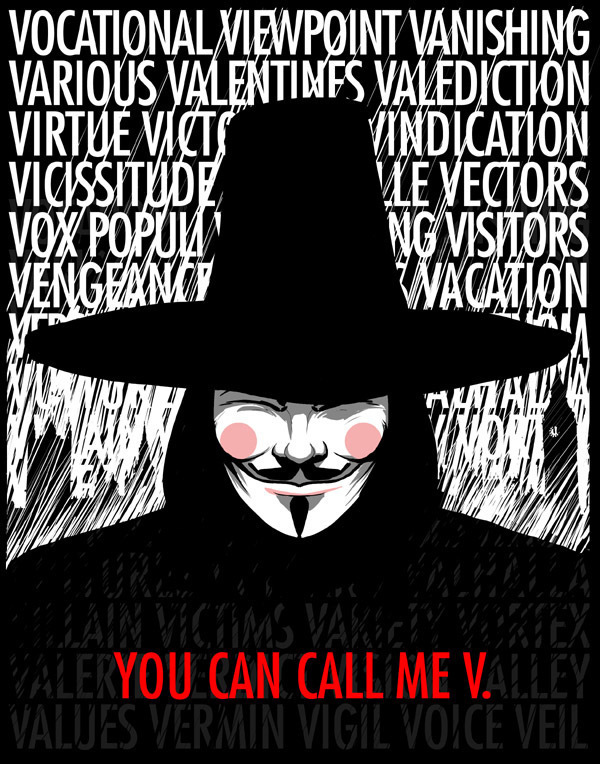Freedom, in terms of life, for Patton is considering life as a series of points at which decisions are made or events are experienced, where critical points are the ‘events’ that ultimately determine the shape of a life. Following Deleuze and Guattari, Patton argues these ‘events’ can be considered in terms of different lines, which produce identity, and are relational to the concept of freedom (or actualisations of freedom). These lines are molar lines, corresponding to rigid segmentation (e.g. man/female), molecular lines, corresponding to fluid overlapping forms of division, and lines of flight, that are paths where things change and become transformed. Rather than use Patton’s example of F. Scott Fitzgerald to illustrate the different lines and critical points (events) of experience, I shall describe them using the film V for Vendetta and the main character V, and then relate them to critical freedom.
In the film V for Vendetta the United Kingdom is ruled by a fascist and totalitarian state, which has gained power through the use of politics of fear. This, mainly, has been achieved through releasing poisonous chemicals on the population, which the government only has the cure for, and then blaming these attacks on terrorists. However, the previous war on terror (in reference to the present one in the ‘real’ world,) is also linked into how the party gain governmental power. They therefore create the sensation of fear within in the state, and claim they can offer security against this terror. This is done through more politics of fear and the curtailing of civil liberties. Those thought to terror the UK are basically regarded as anything non-white, non-heterosexual, and non-British. This describes the molar lines, which represents the segmentation found in bureaucratic and hierarchical institution, ‘creating’ molar identities such as the binary ‘terror threat’ and ‘non-terror threat’, which affirm molar freedoms through molar identity. It also demonstrates that molar lines of segmentation are not fixed, but rather transform through challenges and events, even if this occurs in a reactionary manner.
The character V, who starts/brings the downfall of this government, is a victim of government testing in their attempt to find a cure to the poisonous chemical. These people are some of those rounded up in the reformation and regarded as terror threats. V is the only one to build up a resistance to the poisonous chemical and from him the cure is created. However as a side effect V gains super-human strength, and (more importantly) undergoes other experiences that change him and represent the second line of experience (the molecular line). Now this should be taken at the literal level. The body of V, which holds his mind, goes through physical alterations, through a mixture of the testing and a fire that breaks out at the lab. There are also the other (molecular) transformations of V, where V is changed as a person from reading notes given by the women in the next-door cell. As a culminate effect all the molecular changes that happen to V in the testing facility create a different person, and importantly, a new person emerges that finds new things to care about. This leads onto the third line – the line of flight.
From his experiences in the testing lab V becomes committed to bringing down the government, and creates this trait as an abstract line, which is created from a break of who he was and the character V that emerged from the testing lab. In many of the senses V’s subject is the same person after as a before, but not in the sense that matters for the liberal concept of freedom. V no longer has the same interests nor the same desires and preferences. As Patton notes about Fitzgerald and can be said about V is ‘his goals are not the same, nor are the values that would underpin his strong evaluations’[1] as V and Fitzgerald experience, in their own way, a ‘clean break’, which is what interests Patton, Deleuze, and Guattari. The ‘clean break’ for V is also a clean break from the molar lines of the state, as he no longer associates himself with these values and virtues, and instead creates his own virtues and values, which arguable weigh heavier on him than the molar ones. There is a lot of similarities between Deleuze and Guattari’s line of flight, which can be related to the manifestation of critical freedom, and Nietzsche’s overman, which will be the focus of the next section.
However, at this point there may seem a linear progression between the three lines from the manner I have written about the subject, where the order is molar -> molecular -> flight. This should not be viewed in this style as the three lines co-exist, and are not ever finalised (i.e. they are open concepts).
[1] Paul Patton, Deleuze and the Political p85
(Or can we call him an overman???)....

No comments:
Post a Comment